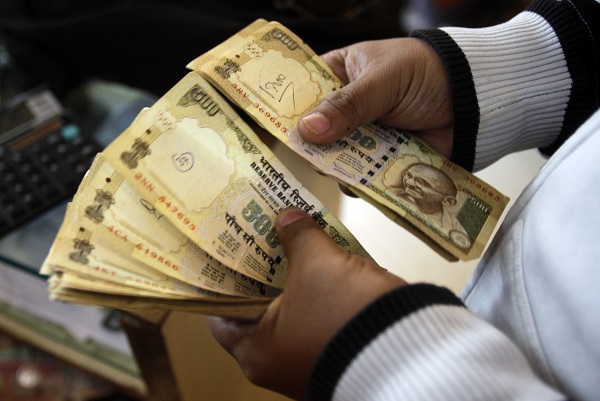Indian rupee hits new low despite central bank moves

An Indian customer counts Indian rupee notes at a foreign currency exchange shop in Bangalore, India, Tuesday, Aug. 20, 2013. India’s rupee plunged to a new record low of 64.60 to the dollar on Wednesday despite suspected central bank attempts to prop up Asia’s worst-performing major currency this year.
AP Photo/Aijaz Rahi
MUMBAI—India’s rupee plunged to a new record low of 64.60 to the dollar on Wednesday despite suspected central bank attempts to prop up Asia’s worst-performing major currency this year.
The rupee declined from its previous low of 64.13 reached on Tuesday.
The slide was so sharp that dealers said the Reserve Bank of India (RBI) is thought to have intervened in late afternoon. But the currency still finished at a new record closing low of 64.11.
“The RBI is suspected to have intervened at around 64.45 levels, selling dollars to aid the rupee,” a dealer said, declining to be named.
The RBI late Tuesday announced it would inject 80 billion rupees ($1.26 billion) into the banking system by buying back long-term government bonds, in a bid to make more credit available to boost slowing economic growth.
Article continues after this advertisementThe move appears to be a partial reversal of a string of measures it has taken since mid-July to tighten liquidity.
Article continues after this advertisementThese have failed to stop the rupee plummeting and instead sent bond yields surging.
Further depreciation seen
Deutsche Bank, in a note to clients on Wednesday, warned that the rupee could depreciate further in coming weeks to as much as 70 to the dollar.
“In a scenario of deep pessimism, currencies can overshoot substantially and remain so for a long time. India, we fear, is entering such a zone,” the report said.
The rupee’s fall on Wednesday also comes amid concern in the markets over the upcoming release of minutes from the US Federal Reserve’s July policy meeting.
The minutes to be released later Wednesday were expected to give indications about a possible rollback of the Fed’s massive stimulus program, which would cause funds to flow back to the United States—and away from emerging economies—as its economy recovers.
“There is a bit of nervousness before the Fed (release),” Shubhada Rao, chief economist with Yes Bank said.
Stocks closed down 1.86 percent after jumping in early trade on news of the RBI’s planned cash injection. Indian stocks have fallen nearly six percent in the past three days on concerns over the rupee and a faltering economy.
Late on Tuesday, the RBI announced its new measures to purchase long-term government bonds, along with other measures to ease pressure on banks, in a bid to make more credit available and bring down borrowing costs for the government.
But the measures sparked accusations from analysts of policy flip-flops.
“The latest moves by the RBI are aimed at cleaning up the unintended mess in the bond market from their convoluted and ineffective currency defence,” Rajeev Malik, senior economist with CLSA, said in an email to AFP.
Yields eased on 10-year benchmark bonds to as much as 8.27 percent on Wednesday, after hitting a five-year-high of more than nine percent the day before.—Salil Panchal